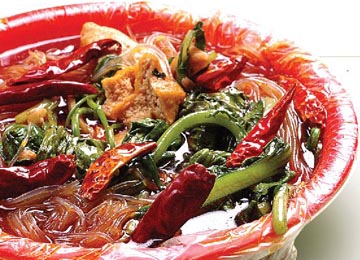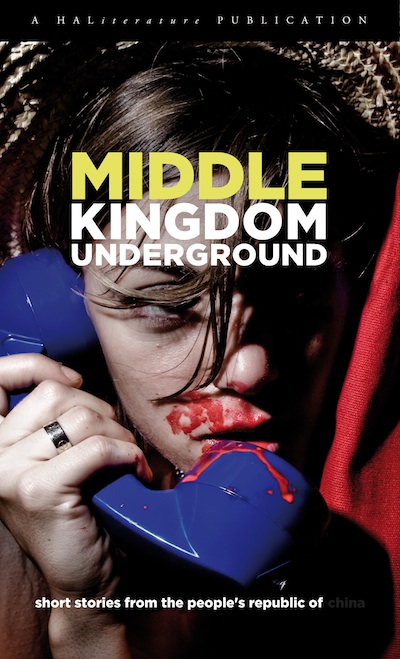The Soup Shop
‘Is this mao cai?’
The man in the cap heard the halting words. He looked at the foreign girl.
‘No.’
His Mandarin was careful. She needed it. So did he. He missed his home dialect in this city.
‘What is it?’
‘Malatang.’
The words were alien. Still, she thought she knew the scent and the colour of the soup; and she wanted something known.
‘From Sichuan?’
Behind a boy prepared trays of cold nuts and beans. The boy paused to listen to the unfamiliar tones. He couldn’t understand the common tongue yet.
‘Yes.’
The man in the white cap smiled. He passed a plastic basket. She accepted it with relief and turned to the dirty fridge with grimy sliding glass doors. On display were vegetables and chunks of meat, skewered on thin sticks.
She filled the basket. He pulled it from her hands. The food was dropped into a vat of soup. Spices frothed over the boiling brew, and she watched.
He turned back to her, embarrassed by an oversight; ‘Sit!’ He gestured up the stairs to the balcony above, half covered by a low roof.
She stooped under the beams papered with sentimental giftwrap, a patchwork of hearts and kittens. Beyond was a small space. Thin aluminium legs supported broad table tops. There were boxes along the walls. The pink and brown cardboard was scuffed.
She sat at a grey table. The seat faced the balcony railings. She gazed down at the street. She liked to see into taxis, whose idle passengers stared at the gutter.
There was a slot machine in the corner. It was only as tall as her stool, too little for an adult. Some time ago children would feed the slot their smallest coins. Then they’d hear tinny music. Now there was no music. A crate of curry powder wedged the machine tight against the wall.
There was another lane like this one in Sichuan, with ‘拆’ – demolish – on every wall and building. It had a shed full of old slot machines. Locals squatted on stools, prodding the stiff buttons and coaxing lights to life.
The lane had a mao cai shop, where there was chilli in the air. Eyes smarted. Sichuan pepper was on the ground and in the food. The hot pink cloves numbed her mouth. Everything eaten afterwards was tasted through a hot floral haze.
Now she could smell the malatang; her soup was carried up the stairs in a flimsy bowl lined with clingfilm. It buckled, bulging with slopping stock. There was no pepper. Shanghai was not Sichuan. Nothing was the same. But she had wanted this to be familiar.
‘Eat.’ The man put the soup on the table.
He saw her frown, then grasp chopsticks and pinch long thin mushrooms from the broth.
He smiled and went downstairs.
She ate another long thin mushroom. She ate the fungus they called wood ear and the wrinkled tofu skin. Beneath were lotus roots and quails eggs, too hot to swallow. She split them with an awkward stab.
Her cheeks burned hot. She bent low to pat spilt soup from her chin. She could see the little restaurant’s sign, dingy red characters stuck onto a transparent sheet. She read them from behind, the words inverted; ‘Henan…spicy soup’. Not Sichuan.
He came back to take her ten quai.
‘Are you from Henan?’
‘Yes.’
‘Why did you come to Shanghai?’
He fixed his gaze on the table, then on the girl. He said something she couldn’t understand. The words came fast; one syllable bled into another. His eyes went to the corner, over the crate and the broken slot machine. He paused. He continued, quiet.
He stopped. His gaze returned to her. She nodded, lost. He nodded back, swept up the chopsticks and the bowl. He ducked below the beam and moved slowly down the steep steps. The small boy waited.




Lovely piece Katrina, I’m so glad you found a writing home in Shanghai and are still crafting those spare, atmospheric phrases. I hope you find a genuine Sichuan place to eat soon – or else come back to visit Chengdu and we can eat Mao Cai instead of French salad!